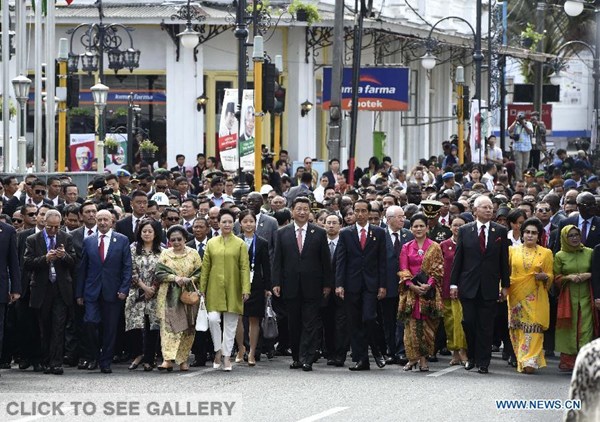Chinese President Xi Jinping, his wife Peng Liyuan, Indonesian Joko Widodo and his wife Iriana take part in a highly symbolic stroll with other Asian and African leaders to commemorate the historic 1955 Bandung Conference in Bandung, Indonesia, April 24, 2015. (Xinhua/Li Xueren)
A historic scene of a mere 50-meter-long street walk conjured up memories 60 years ago of the sprawling Indonesian city of Bandung, nicknamed Paris of Java, on Friday morning.[Special coverage]
The route is usually swallowing with motorcycles and Japanese used cars between Savoy Homann, a 19-century grandiose hotel, and the raw white three-story Merdeka Building, or the Independence Building.
Fine art deco buildings, street stalls, becaks or Indonesian cycle rickshaws, and multiplexes have been jostling for space in the city, a resort attraction during the Dutch colonial rule.
However, all throngs of congestion were gone on Friday, as school children stood along the sidewalk, smiling and waving tiny national flags.
A high troupe of Asian and African leaders sauntered on the road, commemorating the 60th anniversary of the Asian-African Conference, also known as the Bandung Conference.
The same trail was launched in 1955 from the residence to the then venue of the historic conference.
Distinguished names included in the 1955 event list were then Indonesian president Sukarno, former Chinese premier Zhou Enlai and ex-Indian prime minister Javaharlal Nehru.
Friday's walk, part of the 60th anniversary of the first Bandung Conference, is aimed at enshrining the Bandung Spirit which highlights the South-South cooperation.
The Bandung Spirit, with core principles of solidarity, friendship and cooperation, once served to guide the "decolonial" struggle by newly independent countries and cultivated the Non- Aligned Movement thereafter.
"We hope the spirit of the former leaders will be inherited by the present leaders," said Cypri Purba, an Indonesian political analyst.
At the start of Friday's historic walk, Indonesian military honor guard, in all-white uniform, opened the event with flags in hands.
The leaders, led by Indonesian President Joko Widodo and Chinese President Xi Jinping on their less than 10-minute stroll, waved to groups of spectaculars dressed in attires of various cultures from the two continents.
"The first Bandung Conference hosted representatives from 29 countries and now more than 100 nations sent their delegates," said Muhammad Dale, a Bandung resident.
The leaders flew to Bandung, a city with high volcanic peaks, hot springs and tea plantations in easy reach, from Jakarta.
In the capital, they concluded a two-day Asian-African summit, panning out three documents - the Bandung Message, the Declaration on Re-invigorating the New Asian African Strategic Partnership (NAASP) and the Declaration on Palestine.
The leaders, at the summit, agreed to carry on the Bandung Spirit through concrete actions.
Friday's walk ended at Merdeka Building where some leaders delivered speeches to reaffirm their commitment to boosting South- South cooperation.
"In this room presented our predecessors who inspired the world. In this room, the spirit of the initiator and great leader Sukarno still echoes," Joko Widodo said.
In Bandung, the then leaders started the struggle for independence, prosperity and justice for the nations in Asia and Africa, which must be continued 60 years later, he stressed.
Zimbabwean President Robert Mugabe, in his speech, praised the China-initiated Asian Infrastructure Investment Bank as "the voice of the South."
He also called for united efforts in boosting the South-South cooperation.
Later on Friday, the leaders formally endorsed the Bandung Message, which urges for stronger Asian-African cooperation.
Bandung, bathing the cool, cozy dry season breeze, saw the bright blue sky on Friday, as residents and the visiting leaders seemed all anticipating a more harmonious world.

















































